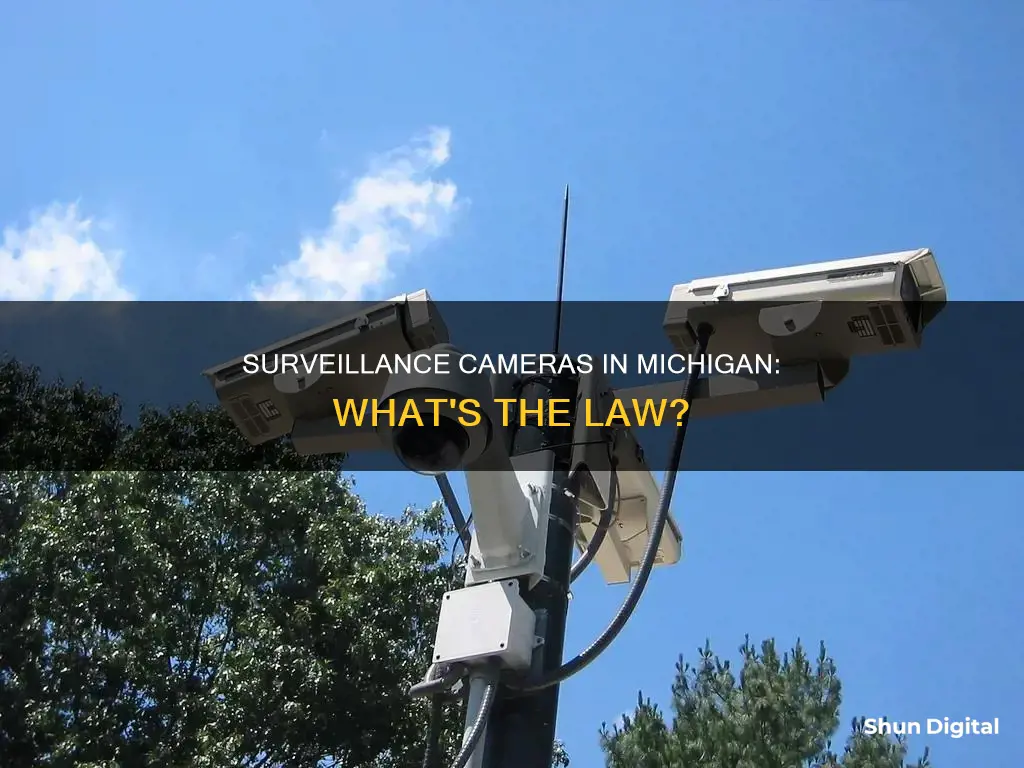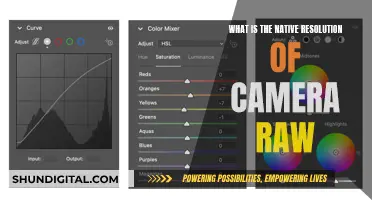
Surveillance in Michigan is a subject of debate, with citizens grappling with the consequences of the rise in the use of surveillance technology. While surveillance is used to help maintain public safety, it also raises concerns about privacy and civil liberties violations. Michigan has a comprehensive legal framework governing surveillance activities by law enforcement agencies and private parties. The state's surveillance laws aim to balance effective law enforcement with protecting individual rights. In Michigan, the use of surveillance cameras in public places is allowed for legitimate purposes such as crime prevention and public safety, but it is prohibited in private places such as bathrooms and changing rooms where individuals have a reasonable expectation of privacy.
| Characteristics | Values |
|---|---|
| Surveillance in public places | Legal as long as used for legitimate purposes such as crime prevention and public safety |
| Surveillance in private places | Legal, but with certain restrictions, e.g. no cameras in areas where there is a reasonable expectation of privacy such as bathrooms and changing rooms |
| Consent | Required from individuals before recording them |
| Surveillance in private residences | Legal as long as occupants are aware of the equipment |
| Surveillance in private residences without consent | Illegal |
| Surveillance in public areas, outdoors | Legal |
| Surveillance in private areas, indoors | Legal status unclear; best practice is to avoid areas where there is an expectation of privacy such as bedrooms, bathrooms, and changing rooms |
| Surveillance with audio | Legal, but consent required from at least one party; Michigan law prohibits the recording of audio of third parties without their consent |
| Surveillance of neighbours | Legal, but indirect views of neighbours' yards are preferable to direct views through their windows |
| Surveillance of employees | Legal, but employees must be informed and cameras must not be used to discriminate or harass |
| Surveillance in schools | Legal in public areas such as hallways, entrances, and parking lots; illegal in areas where there is a reasonable expectation of privacy such as bathrooms and locker rooms |
What You'll Learn
- Surveillance in public places is allowed for crime prevention and public safety
- Surveillance in private places is subject to restrictions
- Surveillance in private residences is allowed, but occupants must be aware
- Surveillance in bathrooms, changing rooms, bedrooms, etc. is prohibited
- Michigan's Video Surveillance Act regulates the use of cameras by private entities

Surveillance in public places is allowed for crime prevention and public safety
Surveillance in public places is allowed in Michigan, provided it is used for legitimate purposes such as crime prevention and public safety. The Michigan Surveillance Laws govern the use of surveillance cameras in the state, with the key laws being the Michigan Fourth Amendment, the Michigan Penal Code, and the Video Surveillance Act.
The Michigan Fourth Amendment protects individuals from unreasonable searches and seizures, ensuring that any surveillance activities are carried out with a warrant based on probable cause. The Michigan Penal Code contains provisions related to the interception, disclosure, or use of wire, oral, or electronic communications, prohibiting unauthorized access or disclosure. The Video Surveillance Act regulates the use of video surveillance cameras by private entities, outlining requirements for notice, consent, and permissible use of footage.
In Michigan, the use of surveillance cameras in public places is permitted as long as it adheres to certain legal requirements. Firstly, individuals must be informed that they are being recorded, and their consent must be obtained. Secondly, surveillance cameras cannot be installed in areas where individuals have a reasonable expectation of privacy, such as bathrooms or changing rooms. This protection of privacy extends to preventing the indiscriminate use of surveillance technology. Thirdly, the cameras must not be used for illegal purposes such as stalking or harassment. Finally, the use of surveillance cameras must not be used to discriminate against individuals based on protected characteristics such as race, gender, or religion.
While there are no specific laws requiring the installation of surveillance cameras in Michigan, there are legal requirements that must be followed. It is important to stay updated with the evolving legal landscape surrounding surveillance technologies, such as facial recognition and drones, to ensure compliance with any new regulations.
Charging Spy Button Cameras: A Step-by-Step Guide
You may want to see also

Surveillance in private places is subject to restrictions
Surveillance in private places in Michigan is subject to several restrictions. The Michigan Penal Code, specifically Section 750.539d, prohibits the installation or use of any device for observing, recording, transmitting, photographing, or eavesdropping in a private place without the consent of the person or persons entitled to privacy in that place. This includes both visual and audio recordings.
The law defines a "private place" as an area where an individual can reasonably expect to be safe from casual or hostile intrusion or surveillance and to which the public or a substantial group of the public does not have access. Examples of private places include bathrooms, bedrooms, changing rooms, and locker rooms.
There are some exceptions to the law. For instance, it does not prohibit security monitoring in a residence if conducted by the owner or principal occupant, as long as it is not for a lewd or lascivious purpose. Additionally, individuals are allowed to record in public places, such as outdoors, as long as it is not in an area where there is an expectation of privacy.
It is important to note that the laws regarding surveillance cameras can vary by county and city in Michigan, so it is advisable to check local laws and regulations before installing any surveillance equipment.
Moultrie W-35i Trail Camera: 16MP Photography Since..
You may want to see also

Surveillance in private residences is allowed, but occupants must be aware
Michigan's Video Surveillance Act (Public Act 436 of 2000) regulates the use of video surveillance cameras by private entities, including homeowners. The Act outlines requirements for conspicuous notice, consent, and the permissible use of video footage.
In Michigan, it is legal to install surveillance cameras in private residences. However, occupants must be aware of the equipment, and the cameras must not be placed in areas where there is a reasonable expectation of privacy, such as bathrooms or changing rooms. This is to protect the privacy of individuals and prevent any legal action against the homeowner.
Michigan law specifically prohibits the willful use of a device to eavesdrop on a conversation without the prior consent of all parties. This means that a homeowner cannot record audio of third parties without their consent.
Additionally, the use of hidden cameras without the consent of the people being recorded is prohibited. The Video Surveillance Act mandates that homeowners provide conspicuous notice when using surveillance cameras that may capture activities beyond their private property.
It is important for homeowners to understand their legal responsibilities when installing surveillance cameras to ensure they are complying with privacy laws and respecting the rights of occupants and neighbours.
Focusing Phantom 4 Camera: Tips for Clearer Shots
You may want to see also

Surveillance in bathrooms, changing rooms, bedrooms, etc. is prohibited
Surveillance laws in Michigan are governed by a combination of federal and state laws, which include the Fourth Amendment of the U.S. Constitution, the Michigan Penal Code, and Michigan's Video Surveillance Act. While these laws allow the use of surveillance cameras in public places for legitimate purposes such as crime prevention and public safety, they impose certain restrictions on the use of surveillance in private places.
Surveillance in bathrooms, changing rooms, and bedrooms is prohibited in Michigan. The state's laws uphold individuals' "reasonable expectation of privacy," which includes privacy in private places such as bathrooms, changing rooms, and bedrooms. Installing surveillance cameras in these areas is illegal and violates individuals' privacy rights.
Michigan law prohibits the unauthorized installation of devices in private places for observing, photographing, or eavesdropping on unsuspecting individuals. This includes the use of hidden cameras without the consent of the individuals being recorded. The violation of these laws can result in criminal charges and civil lawsuits.
The Michigan State Police support bills that aim to expand the state's penal code to include the use of newer mobile devices, such as camera phones and miniature cameras, to capture images of people in a state of undress in places like school locker rooms or public streets. These bills also address the distribution and transmission of such recordings, aiming to deter and appropriately punish offenders.
Polaroid Camera Focus: Infinity and Beyond?
You may want to see also

Michigan's Video Surveillance Act regulates the use of cameras by private entities
Michigan's Video Surveillance Act (Public Act 436 of 2000) regulates the use of surveillance cameras by private entities, such as businesses and homeowners. The Act outlines specific requirements and restrictions to balance security needs with individual privacy rights.
Firstly, the Act requires conspicuous notice when using surveillance cameras. Private entities must ensure that individuals are aware of the presence of surveillance cameras. This can be achieved through appropriate signage or direct communication.
Secondly, the Act emphasizes the importance of consent. Private entities should obtain consent from individuals before recording them, particularly in private places. This means informing occupants, customers, or employees that they are being recorded and have consented to it. Failure to obtain consent can result in legal consequences.
Thirdly, the Act restricts the placement of surveillance cameras in areas where individuals have a reasonable expectation of privacy. This includes bathrooms, changing rooms, bedrooms, and other private spaces. Surveillance cameras should be positioned to respect the privacy of individuals and avoid capturing activities beyond the scope of the private property being monitored.
Additionally, the Act prohibits the use of surveillance cameras for illegal purposes, such as stalking, harassment, or discrimination. Private entities must ensure that the footage is not used for any unlawful or discriminatory activities.
The Video Surveillance Act also addresses the permissible use of video footage. It provides guidelines for storing, accessing, and sharing the recorded material while respecting the privacy rights of individuals captured on camera.
Overall, Michigan's Video Surveillance Act aims to strike a balance between the benefits of video surveillance for security and the protection of individual privacy. By regulating the use of cameras by private entities, the Act ensures that surveillance activities are conducted within a legal framework that respects the rights and freedoms of Michigan citizens.
Charging Enel3e Camera Battery: Alternative Methods to Try
You may want to see also
Frequently asked questions
Yes, it is legal to install security cameras inside your home in Michigan, as long as they are not in areas where people have a reasonable expectation of privacy, such as bathrooms and changing rooms.
If you live alone, you do not need consent. However, if you have roommates or guests, they must be made aware of the equipment.
Yes, it is legal to install security cameras outside your home in Michigan.
Yes, the use of surveillance cameras in private places such as homes and businesses is subject to certain restrictions. For example, it is illegal to install surveillance cameras in areas where people have a reasonable expectation of privacy, and the use of hidden cameras without consent is prohibited.







